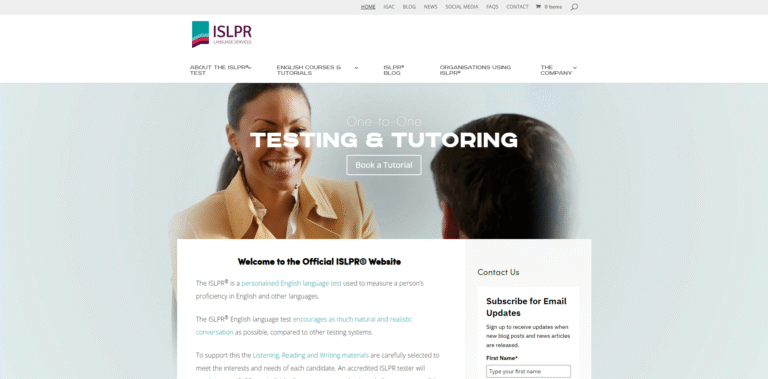Analysing exam questions effectively is a critical skill that can significantly influence your exam success.
In the high-pressure environment of examinations, students often find themselves overwhelmed by the sheer volume of content they need to recall and the variety of question formats they encounter.
Whether faced with multiple-choice, short-answer, or composition questions, mastering the art of question analysis is essential for exam success. It not only helps you respond accurately but also ensures that you maintain focus on the specifics being asked.
Shop laptop & School bags
Check out top-quality laptops and stylish school bags at Zed PCs – perfect for work, study, and on-the-go convenience! Shop now and find unbeatable deals on the essentials you need. For more information, don’t hesitate to get in touch with the website directly. Come one, come all.
Effective question analysis enables you to dissect each question, revealing its underlying requirements and guiding you toward a well-structured response.
By understanding the key components of a question—such as the topic, scope, and directive words—you can better align your answers with the examiner’s expectations.
This skill empowers you to identify what the question is truly asking, allowing you to avoid common pitfalls like misinterpretation and off-topic responses.
Moreover, developing strong question analysis skills can enhance your overall confidence during exams.
Knowing how to approach each question strategically means you can manage your time more efficiently, allocate your efforts appropriately based on marks assigned, and ultimately improve your chances of achieving higher grades.
In this way, question analysis serves as a foundational element of effective exam preparation and performance, equipping you with the tools you need to excel.
Importance of Question Analysis
Understanding the importance of question analysis is essential. This skill helps prevent misinterpretation, optimizes your time management, and allows you to craft more focused answers.
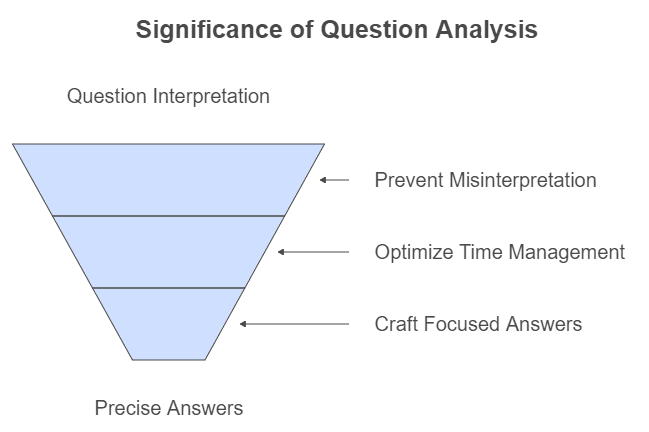
Many students make the common mistake of rushing into answers without fully comprehending the questions, leading to off-topic responses, wasted time, and ultimately, lost marks.
By learning how to analyse questions, you can provide more precise answers that align with the examiner’s expectations.
Types of Questions For Exam Success
Recognizing the various types of questions, you might encounter in an exam is the next step. Each question type requires a distinct approach.
Directive words, such as “discuss,” “evaluate,” “compare,” “analyse,” and “explain,” are vital in understanding what the question requires.
For instance, a “discuss” question asks you to explore all aspects of a topic, while an “evaluate” question requires you to assess the importance of something by weighing its pros and cons.
Shop laptop & School bags
Check out top-quality laptops and stylish school bags at Zed PCs – perfect for work, study, and on-the-go convenience! Shop now and find unbeatable deals on the essentials you need. For more information, don’t hesitate to get in touch with the website directly. Come one, come all.
Other common question types include multiple-choice questions, which test your ability to identify the correct answer quickly; short-answer questions In subjects like Civic Education, which require concise responses; essay (composition) questions, in English paper 1 which call for a deeper understanding organized into a structured format; and problem-solving questions, typically found in subjects like mathematics or science, which require you to apply concepts to find solutions.
Familiarity with these question types enables you to prepare strategically and manage your time effectively during exams.
Breaking Down the Question
Once you identify the question type, breaking it down into its components is essential for clarity. Start by identifying the topic—the main subject of the question.
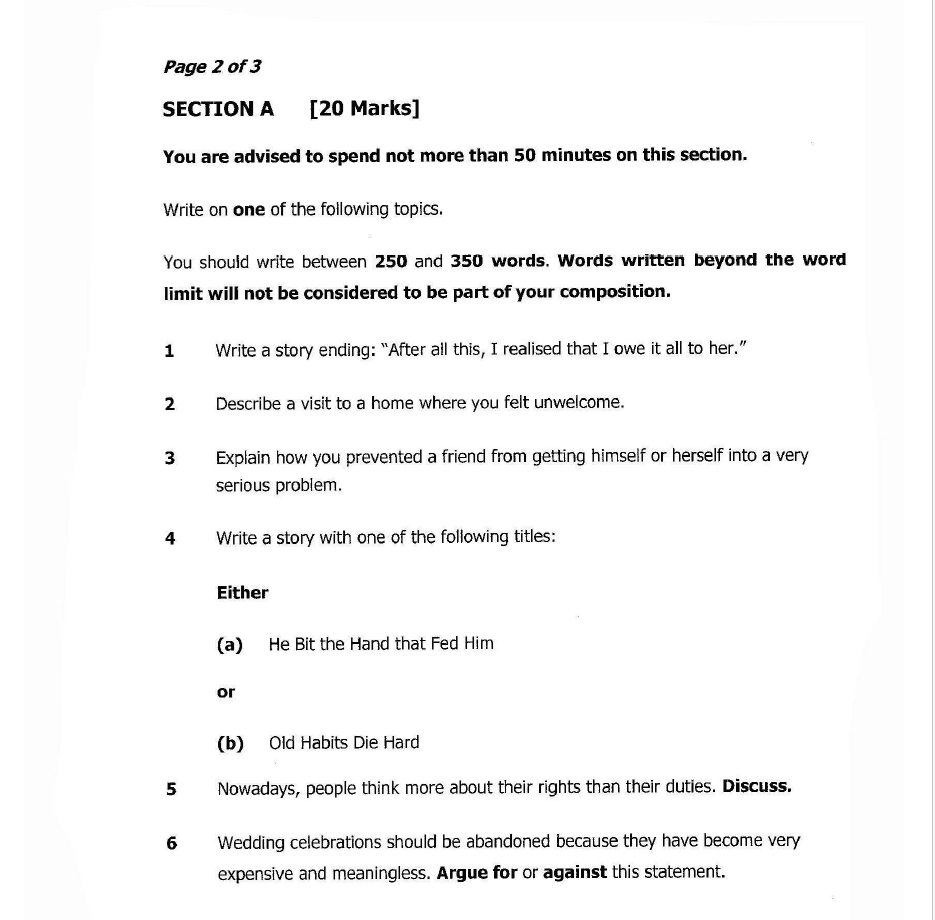
Next, determine the scope by looking for any specified time periods, events, or case studies, as this helps keep your answer relevant. Additionally, pinpoint key terms that indicate how to approach the question.
For example, consider the question number 2, “Describe a visit to a home where you felt unwelcome.”
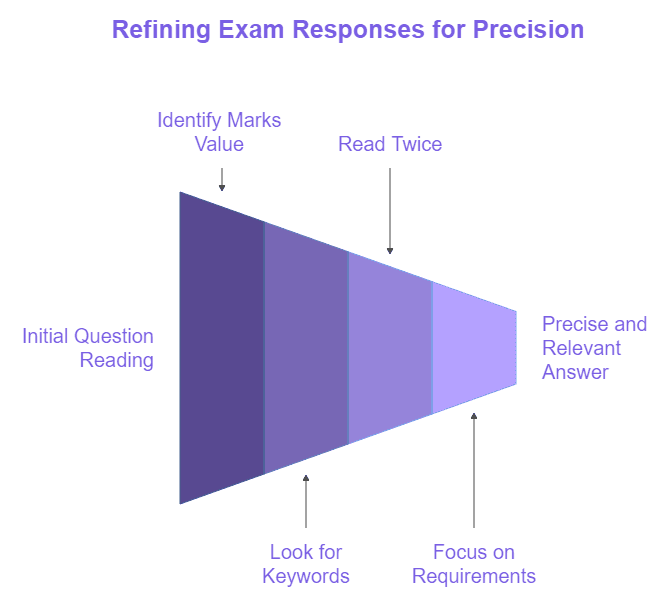
Here, the topic is description of a visit, the scope is home where you were unwelcome, and the directive word “describe” indicates the need to paint a picture in words to show why you felt unwelcome in that home.
Identifying Question Requirements
Identifying the specific requirements of the question is equally important. Exam questions often have marks assigned, indicating how detailed your response should be.
A question worth 20 marks, for instance, necessitates a more comprehensive answer than one worth 5 marks. Look for keywords and phrases like “justify your answer,” “with examples,” or “in detail,” which indicate how thorough your response should be.
Shop laptop & School bags
Check out top-quality laptops and stylish school bags at Zed PCs – perfect for work, study, and on-the-go convenience! Shop now and find unbeatable deals on the essentials you need. For more information, don’t hesitate to get in touch with the website directly. Come one, come all.
To avoid common pitfalls, such as misreading questions or going off-topic, always read the question twice to ensure complete understanding and stick strictly to what is being asked.
Planning Your Answer
After analysing the question, planning your answer is crucial. Take a few moments to outline your response before you begin writing.
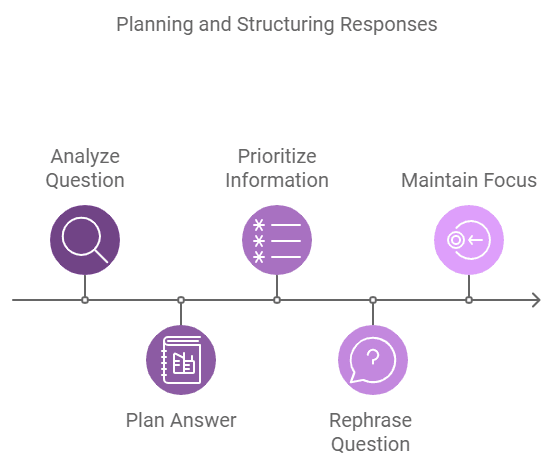
For essays, list the main points to cover in each paragraph, and for short-answer questions, mentally note the key information to include. Prioritize the most important aspects of the question, addressing those first before adding secondary details.
Rewriting the question in your own words can also aid understanding; for example, if the question asks, “Explain how climate change affects food security,” you might rephrase it as, “How does the changing climate impact the availability and stability of food sources?”
This technique clarifies the question’s intent and keeps you on track.
Practicing Question Analysis
Finally, practice is essential for mastering question analysis. Engage with sample questions regularly to enhance your speed and confidence during exams.
Utilize previous exam papers as valuable resources, offering insight into likely questions and a realistic practice context.
If studying with classmates, analyse questions together, breaking them down and discussing their requirements to deepen your understanding.
Shop laptop & School bags
Check out top-quality laptops and stylish school bags at Zed PCs – perfect for work, study, and on-the-go convenience! Shop now and find unbeatable deals on the essentials you need. For more information, don’t hesitate to get in touch with the website directly. Come one, come all.
Conclusion
In conclusion, effectively analysing exam questions is a vital skill that can enhance your exam performance.
Always read questions carefully, paying close attention to directive words, break down each question by identifying its topic, scope, and key terms, and plan your answers thoroughly before writing.
By practicing these techniques consistently, you will approach exam questions with greater confidence, speed, and accuracy, ultimately leading to improved performance under exam conditions.






